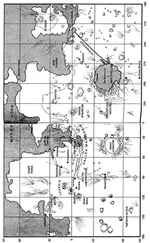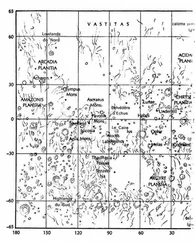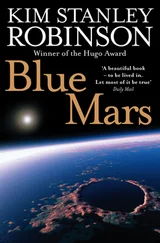Kim Robinson - Blue Mars
Здесь есть возможность читать онлайн «Kim Robinson - Blue Mars» — ознакомительный отрывок электронной книги совершенно бесплатно, а после прочтения отрывка купить полную версию. В некоторых случаях можно слушать аудио, скачать через торрент в формате fb2 и присутствует краткое содержание. Год выпуска: 1996, ISBN: 1996, Издательство: Spectra/Bantam Dell/Random House, Жанр: Космическая фантастика, на английском языке. Описание произведения, (предисловие) а так же отзывы посетителей доступны на портале библиотеки ЛибКат.
- Название:Blue Mars
- Автор:
- Издательство:Spectra/Bantam Dell/Random House
- Жанр:
- Год:1996
- ISBN:0-553-10144-7
- Рейтинг книги:3 / 5. Голосов: 1
-
Избранное:Добавить в избранное
- Отзывы:
-
Ваша оценка:
- 60
- 1
- 2
- 3
- 4
- 5
Blue Mars: краткое содержание, описание и аннотация
Предлагаем к чтению аннотацию, описание, краткое содержание или предисловие (зависит от того, что написал сам автор книги «Blue Mars»). Если вы не нашли необходимую информацию о книге — напишите в комментариях, мы постараемся отыскать её.
Green Mars
The Martian Chronicles
Dune
Piblishers Weekly st
Blue Mars — читать онлайн ознакомительный отрывок
Ниже представлен текст книги, разбитый по страницам. Система сохранения места последней прочитанной страницы, позволяет с удобством читать онлайн бесплатно книгу «Blue Mars», без необходимости каждый раз заново искать на чём Вы остановились. Поставьте закладку, и сможете в любой момент перейти на страницу, на которой закончили чтение.
Интервал:
Закладка:
“Ah.”
Terrible silence, despite all the noise.
“Can I come with you?”
Burning sensation in the skin of the face; capillary engorgement; very odd. But he must remember to speak! “Oh yes.”
And then everyone sitting around, thinking, talking, remembering. Sipping Maya’s tea. Maya looked content, taking care of them. Much later, well into the middle of the night, with almost everyone still slumped in a chair, or hunched over the heater, Sax decided he would go over to the trailer park, where they had spent their first few months. Just to see.
Nadia was already out there, lying down on one of the mattresses. Sax pulled down another one from the wall; his old mattress, yes. And then Maya was there, and then all the rest of them, pulling along the reluctant and one had to say fearful Desmond, sitting him on a mattress in the middle, gathering around him, some in their old spots, others who had slept in other trailers filling the empty mattresses, the ones that had been occupied by people now gone. A single trailer now housed them all quite easily. And sometime in the depth of the night they all lay down, and slid down the slow uneven glide into sleep. All around the room, people falling to sleep in their beds — and that too was a memory, drowsy and warm, this was how it had always felt, to drift off in a bath of one’s friends, weary with the day’s work, the oh-so-interesting work of building a town and a world. Sleep, memory, sleep, body; fall thankfully into the moment, and dream.
They sailed out of the Florentineon a windy cloudless day, Ann at the rudder and Sax up in the starboard bow of the sleek new catamaran, making sure the anchor cat had secured the anchor; which reeked of anaerobic bottom mud, so much so that Sax got distracted and spent some time hanging over the rail looking at samples of the mud through his wristpad magnifying lens: a great quantity of dead algae and other bottom organisms. An interesting question whether or not this was typical of the North Sea’s bottom, or was restricted for some reason to the Chryse Gulf environs, or to the Florentine, or shallows more generally —
“Sax, get back here,” Ann called. “You’re the one who knows how to sail.”
“So I am.”
Though in truth the boat’s AI would do everything at the most general command; he could say for instance “Go to Rhodes,” and there would be nothing more to be done for the rest of the week. But he had grown fond of the feeling of a tiller under his hand. So he abandoned the anchor’s muck to another time, and made his way to the wide shallow cockpit suspended between the two narrow hulls.
“Da Vinci is about to go under the horizon, look.”
“So it is.”
The outer points of the crater rim were the only parts of Da Vinci Island still visible over the water, though they weren’t more than twenty kilometers away. There was an intimacy to a small globe. And the boat was very fast; it hydroplaned in any wind over fifty kilometers an hour, and the hulls had underwater outriggerkeels that extended and set in various dolphinlike shapes, which along with sliding counterbalance weights in the cross struts kept the windward hull in contact with the water, and the leeward hull from driving too far under. So in even moderate winds, like the one striking their unfurled mast sail now, the boat shoved up onto the water and skated over it like an iceboat over ice, moving at a speed just a few percent slower than the wind itself. Looking over the stern Sax could see that a very small percentage of the hulls were actually in contact with the water; it looked like the rudder and the outrigger-keels were the only things that kept them from taking flight. He saw the last bits of Da Vinci Island disappear, under a bouncing serrated horizon no more than four kilometers away from them. He glanced at Ann; she was clutching the rail, looking back at the brilliant white V-tapestries of their wake. Sax said, “Have you been at sea before?” meaning, entirely out of the sight of land.
“No.”
“Ah.”
They sailed on north, out into Chryse Gulf. Copernicus Island appeared over the water to their right, then Galileo Island behind it. Then both receded under the blue horizon again. The swells on the horizon were individually distinct, so that the horizon was not a straight blue line against the sky, but rather a shifting array of swell tops, one after another in swift succession. The groundswell was coming out of the north, almost directly ahead of them, so that looking to port or starboard the horizon line was particularly jagged, a wavy line of blue water against the blue sky, in a too-small circle surrounding the ship — as if the proper Terran distance to the horizon were stubbornly embedded in the brain’s optics, so that when they saw things clearly here, they would always appear to stand on a planet too small for them. Certainly there was a look of the most extreme discomfort on Ann’s face; she glared at the waves, groundswell after groundswell lifting the bow and then the stern. There was a cross chop nearly at right angles to the groundswell, pushed by the west wind and ruffling the bigger broader swells. Wavetank physics; one could see it all laid out; it reminded Sax of the physics lab on the second story of the northeasternmost building in his high school, where hours had passed like minutes, the flat little wavetank full of marvels. Here the groundswell originated in the North Sea’s perpetual eastward motion around the globe; the swell was greater or smaller depending on whether local winds reinforced it or interfered with it. The light gravity made for big broad waves, quickly generated by strong winds; if today’s wind got very much stronger, for instance, then the wind-chop from the west would quickly grow bigger than the groundswell from the north, and obscure it completely. Waves on the North Sea were notorious for their size and mutability, their recombinant surprises, though it was also true that they moved fairly slowly through the water; big slow hills, like the giant dunes of Vastitas far underneath them, migrating around the planet. Sometimes they could get very big indeed; in the aftermath of the typhoons that blew over the North Sea, waves seventy meters high had been reported.
This lively cross chop seemed enough for Ann, who was looking a bit distressed. Sax could not think what to say to her. He doubted that his thoughts on wave mechanics would be appropriate, though it was very interesting of course, and would be to anyone interested in the physical sciences. As Ann was. But perhaps not now. Now the sheer sensory array of water, wind, sky — it looked like it was enough for her. Perhaps silence was in order.
Whitecaps began to roll down the faces of some of the cross-chop waves, and Sax immediately checked into the ship’s weather system to see what the wind speed was. The ship had it at thirty-two kilometers per hour. So this was about the speed at which the crests of waves were first knocked over. A simple matter of surface tension against wind speed, calculable, in fact… yes, the appropriate equation in fluid dynamics suggested they should start to collapse at a wind speed cr thirty-five kilometers per hour, and here they were: whitecaps, startlingly white against the water, which was a dark blue, Prussian blue Sax thought it might be. The sky today was almost sky blue, slightly empurpled at the zenith, and somewhat whitened around the sun, with a metallic sheen between sun and the horizon under it.
“What are you doing?” Ann said, sounding annoyed.
Sax explained, and she listened in stony silence. He didn’t know what she might be thinking. That the world was somewhat explicable — he always found that a comfort. But Ann… well, it could be as simple as seasickness. Or something from her past, distracting her; Sax had found in the weeks since the experiment at Underhill that he was often distracted by some past incident, rising unbidden from a great bulk of them in his mind. Involuntary memory. And for Ann, that might include negative incidents of one kind or another; Michel had said she had been mistreated as a child. It still seemed to Sax too shocking to believe. On Earth men had abused women; on Mars, never. Was that true? Sax did not know for sure, but he felt it was true. This was what it meant to live in a just and rational society, this was one of the main reasons it was a good thing, a value. Possibly Ann would know more about the reality of the situation these days. But he did not feel comfortable asking her. It was clearly contraindicated.
Читать дальшеИнтервал:
Закладка:
Похожие книги на «Blue Mars»
Представляем Вашему вниманию похожие книги на «Blue Mars» списком для выбора. Мы отобрали схожую по названию и смыслу литературу в надежде предоставить читателям больше вариантов отыскать новые, интересные, ещё непрочитанные произведения.
Обсуждение, отзывы о книге «Blue Mars» и просто собственные мнения читателей. Оставьте ваши комментарии, напишите, что Вы думаете о произведении, его смысле или главных героях. Укажите что конкретно понравилось, а что нет, и почему Вы так считаете.












